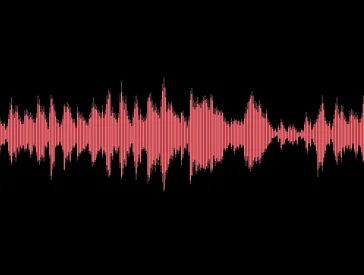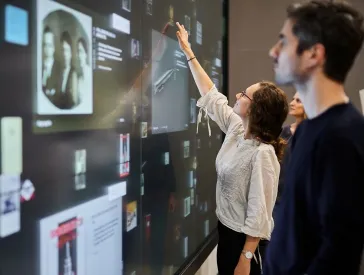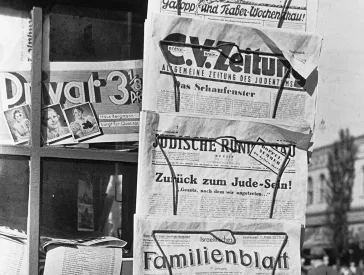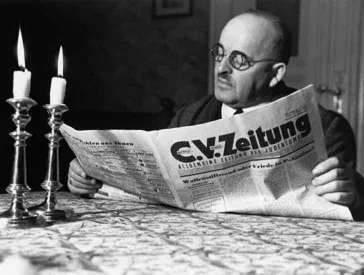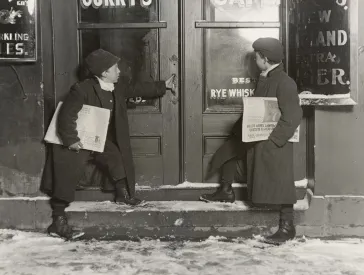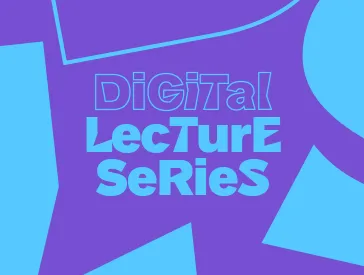JMB is starting a digital lecture series with Ofer Waldman talking about Jewish intellectuals
Press Release, Tue 13 May 2025
On 22 May 2025 the Jewish Museum Berlin (JMB) is kicking off its five-part Digital Lecture Series Déjà-vu? A New Search for Old Answers. Each edition features the journalist and author Ofer Waldmann together with a prominent Jewish personality discussing the thought of a selected Jewish intellectual of the late nineteenth and early twentieth centuries and their relevance today. Each event begins with a lecture by the invited guest and is followed by a conversation with Ofer Waldman. The audience will then have the opportunity to ask questions. Some of the lectures and conversations will be in German and some in English.
- Contact
-
Dr. Margret Karsch
Head of Press
T +49 (0)30 259 93 419
presse@jmberlin.de
- Address
Jewish Museum Berlin Foundation
Lindenstraße 9–14
10969 Berlin
Hetty Berg, director of the JMB: “This series examines which long-forgotten answers offered by outstanding Jewish thinkers of the twentieth century are relevant today in responding to the present challenges facing Jewish life in Germany. What historical works do contemporary intellectuals refer to in search of answers to today’s pressing questions? And how do they read the texts they have selected? The conversations create bridges to present-day social and political challenges. For example, interlocutors might discuss how social power structures and ideological mechanisms shape the ways we think.”
The author and journalist Ofer Waldman, PhD, was born in Jerusalem in 1979. In 2021 he was awarded the radio prize of the ARD German public broadcasting company. His literary debut Singularkollektiv. Erzählungen, a short story collection, was published by Wallstein in 2023. This was followed by Gleichzeit, his correspondence with Sasha Marianna Salzmann about the world after 7 October 2023, published in 2024 by Suhrkamp.
We would like to thank the Berthold Leibinger Foundation for its support of the Digital Lecture Series.
22 May 2025, 7 pm, online lecture and conversation with Delphine Horvilleur discussion Gershom Scholem (in English)
The first in the series features Delphine Horvilleur and Ofer Waldman discussing the religious historian Gershom Scholem (1897–1982). In 1926, three years after Scholem emigrated to Palestine (Jerusalem), he wrote a letter to Franz Rosenzweig titled Confession on the Subject of Our Language. In it, Scholem links the transformation of Hebrew from the holy language to an everyday, vernacular language, as he heard in Jerusalem, with the concept of apocalyptic threat. Even today, the letter is incredibly topical.
Delphine Horvilleur was born in Nancy, France, in 1974. She is one of the rabbis of Judaïsme En Mouvement, a liberal Jewish movement based in Paris, and she is also an author. Among her books that have been translated into English are Anti-Semitism Revisited: How the Rabbis Made Sense of Hatred (2021); Living With Our Dead: On Loss and Consolation (2024); and How Isn’t It Going? Conversations after October 7 (2025).
12 Jun 2025, 7 pm, online lecture and conversation with Moshe Sakal discussion Magnus Hirschfeld (in English)
In the second lecture, Moshe Sakal and Ofer Waldman explore the life and legacy of Magnus Hirschfeld (1868–1935). The focus will be on Hirschfeld as a Jewish intellectual, immigrant, and gay man in Berlin and in exile in France, and on his effort to change how certain groups are perceived in society. He fought for the Other to be recognized and ultimately he himself was persecuted and driven into exile, where he died only two years later. In conversation with Ofer Waldman, Sakal reflects on how Hirschfeld’s ideas continue even today to influence our understanding of sexuality and Jewish identity.
Moshe Sakal, born in Tel Aviv in 1976, has been living in Berlin since 2019. He is the author of six novels and co-founder of the Berlin publishing company Altneuland Press. His texts have been translated into numerous languages and have appeared in various publications, including the German daily Frankfurter Allgemeine Zeitung.
18 Sep 2025, 7 pm, online lecture and conversation with Yael Kupferberg discussing Max Horkheimer (in German)
The third lecture features Yael Kupferberg talking with Ofer Waldman about Max Horkheimer (1895–1973) and Critical Theory as Jewish philosophy. Max Horkheimer, philosopher and founder of the Frankfurt School, did not only reflect on human existence, but also continued to write Jewish philosophy after Auschwitz. He aimed to save Judaism philosophically without universalizing it and to defend diasporic Judaism without renouncing an affirmation of the State of Israel. The tension between philosophical-Jewish universalism and pragmatic-existential particularity still characterizes Jewish existence today; and Horkheimer’s thoughts – especially as regards antisemitism – seem as relevant as ever.
Yael Kupferberg, PhD, was born in Berlin in 1978. A literary scholar with a post-doctoral (habilitation) degree, she presently holds the Martin Buber Professorship for Jewish Philosophy of Religion at Frankfurt am Main’s Goethe University. From October 2018 to September 2024, Kupferberg also held various positions at the Center for Research on Antisemitism at the Technical University of Berlin. Her book on studies on Judaism in Max Horkheimer’s late works (Zum Bilderverbot. Studien zum Judentum im späten Werk Max Horkheimers) was published by Wallstein Publishers in 2022.
16 Okt 2025, 7 pm, online lecture and conversation with Eva Illouz discussing Jean Améry (in English)
In the fourth lecture, Ofer Waldman will be speaking with the French-Israeli sociologist Eva Illouz about the writer Jean Améry, born in Vienna in 1912. His essays My Jewishness (Mein Judentum, 1978), The Limits of Solidarity (Grenzen der Solidarität, 1977), and those on the new antisemitism from the years 1969–1976 have been republished both in German and French in 2024. They have also been published in English in 2021 as Essays on Antisemitism, Anti-Zionism, and the Left. Améry offers therein a lucid description of his existential connection to Israel. The former Résistance fighter, concentration camp prisoner, and survivor of Auschwitz also comments on how leftwing anti-Zionism as “virtuous antisemitism” separates him from the New Left.
Based on her foreword for the new French edition, Eva Illouz discusses the tension of present-day Jewish existence, for which neither Zionism nor the political left- or right-wing can serve as an orientation, a way forward, or a solace. Améry demonstrates, according to Illouz, an “orphaned” Jewish consciousness.
Information regarding the fifth lecture will be announced in due time on the JMB website.
For current information on the Digital Lecture Series, go to:
https://www.jmberlin.de/en/deja-vu.
